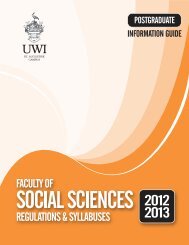Faculty of Humanities and Education (Postgraduate) - The University ...
Faculty of Humanities and Education (Postgraduate) - The University ...
Faculty of Humanities and Education (Postgraduate) - The University ...
You also want an ePaper? Increase the reach of your titles
YUMPU automatically turns print PDFs into web optimized ePapers that Google loves.
POSTGRADUATE REGULATIONS & SYLLABUSES 2012 - 2013<br />
THE FACULTY OF HUMANITIES & EDUCATION<br />
REFERENCES<br />
Anthony, W. P., Kacmar, K. M., & Perrewe, P. L. (2002). Human<br />
resource management: A strategic approach (4th ed.). Fort<br />
Worth, TX: Harcourt College Publishers.<br />
Davies, B., & Ellison, L. (Eds.). (1997). School leadership for the 21 st<br />
century: A competency <strong>and</strong> knowledge approach. London:<br />
Routledge.<br />
French, W. L., & Bell, C. H. (1999). Organization development:<br />
Behavioral science interventions for organization<br />
improvement (6 th ed.). Upper Saddle River, NJ: Prentice Hall.<br />
Hersey, P., Blanchard, K .H., & Johnson, D. E. (1996). Management<br />
<strong>of</strong> organizational behavior: Utilizing human resource (7 th ed.).<br />
Upper Saddle River, NJ: Prentice-Hall.<br />
Howard, E., Howell, B., & Brainard, E. (1987). H<strong>and</strong>book<br />
for conducting school climate improvement projects.<br />
Blommington, IN: Phi Delta Kappa Eduational Foundation.<br />
Hoy, W., & Miskel, C. (2005). <strong>Education</strong>al administration: <strong>The</strong>ory,<br />
research <strong>and</strong> practice (7 th ed.). New York: McGraw-Hill.<br />
Kimbrough, R. B., & Nunnery, M. Y. (1992). <strong>Education</strong>al<br />
administration: An introduction (4th ed.). New York:<br />
Macmillan.<br />
Kimbrough, R. B., & Burkett, C. W. (1990). <strong>The</strong> principalship:<br />
Concepts <strong>and</strong> practices. Englewood Cliffs, NJ: Prentice Hall.<br />
Owens, R. G. (1999). Organizational behavior in education (6 th ed.).<br />
London: Allyn & Bacon.<br />
Szilagyi, A. D., & Wallace, M. (1990). Organizational behavior <strong>and</strong><br />
performance (5th ed.). Glenview, IL: Scott Foresman.<br />
YEAR:<br />
SEMESTER:<br />
COURSE CODE: EDEA 6113<br />
COURSE TITLE: ORGANIZATION DEVELOPMENT<br />
NUMBER OF CREDITS: 4<br />
COURSE DESCRIPTION:<br />
Overview<br />
<strong>The</strong> local educational system <strong>and</strong> its subsystems seem to be<br />
mired in colonial <strong>and</strong> traditional paradigms. Although there<br />
have been incremental changes over the years, the basic culture<br />
<strong>of</strong> education maintains the status quo that existed even prior<br />
to independence. Nevertheless, our recurrent aspirations are<br />
toward quality improvements in every aspect <strong>of</strong> the system.<br />
<strong>The</strong>re are no shortages <strong>of</strong> conceptions <strong>of</strong> what a modern<br />
educational system or school should be. However, the skills or<br />
methods, techniques, strategies, <strong>and</strong> interventions related to<br />
organization change or transformation have not been properly<br />
engaged. Organization Development is therefore introduced as<br />
a course that is essential for inducting <strong>and</strong> teaching the ways<br />
by which leaders as change agents proceed toward developing<br />
<strong>and</strong> institutionalizing worthwhile cultures in educational<br />
organizations. Organization Development uses a normative/reeducative<br />
approach to change.<br />
<strong>The</strong> information derived from theories <strong>of</strong> organization <strong>and</strong><br />
administration, as well as the underst<strong>and</strong>ings <strong>of</strong> action research,<br />
will be applied to the problems <strong>and</strong> the problem-solving<br />
capabilities <strong>of</strong> the school or other subsystem for its improvement,<br />
<strong>and</strong> the development <strong>of</strong> viable school or subsystem cultures.<br />
<strong>The</strong> course will target the need for improvement, change,<br />
development, etc., at the system, group, <strong>and</strong> individual (shallow,<br />
intermediate, <strong>and</strong> deep) levels <strong>of</strong> intervention.<br />
OBJECTIVES<br />
Students will:<br />
1. apply their underst<strong>and</strong>ings <strong>of</strong> educational, administration,<br />
<strong>and</strong> organisational theory to designs for viable educational<br />
cultures;<br />
2. use the skills <strong>of</strong> action research in data collection, diagnosis,<br />
<strong>and</strong> development <strong>of</strong> positive organisational cultures;<br />
3. employ several types <strong>of</strong> diagnostic approaches to<br />
organisational problems;<br />
4. choose <strong>and</strong>/or design interventions to solve organisational<br />
problems at shallow, intermediate, <strong>and</strong> deep levels;<br />
5. implement change strategies at all levels <strong>of</strong> the<br />
organisation;<br />
6. engage in collaborative processes to bring about change;<br />
7. use skills to develop or solve problems relating to conflict<br />
management, personnel management, consensus building,<br />
team-building, etc., for the purpose <strong>of</strong> improving the<br />
efficiency <strong>and</strong> effectiveness <strong>of</strong> the system;<br />
8. develop skills for formulating <strong>and</strong> writing school policies.<br />
CONTENT<br />
Students will share <strong>and</strong> use underst<strong>and</strong>ings that have been<br />
learnt in other courses <strong>and</strong> integrate them with underst<strong>and</strong>ings<br />
<strong>of</strong>:<br />
• Organisation theories <strong>and</strong> designs, holistic systems<br />
models<br />
• Scenario development <strong>of</strong> desired cultures<br />
• Diagnostic models <strong>and</strong> techniques for use in data gathering<br />
<strong>of</strong> present cultures, needs surveys, SWOT, <strong>and</strong>/or force field<br />
analysis<br />
• <strong>The</strong> organisation development <strong>and</strong> change processes<br />
• Beliefs,values,norms,power,<strong>and</strong> leadership as essentials <strong>of</strong><br />
culture<br />
• Interventions theory <strong>and</strong> models:<br />
• Shallow level (the macro system)<br />
• Intermediate level (inter-<strong>and</strong> intra-group processes<br />
<strong>and</strong> relationships)<br />
• Individual level (inter-<strong>and</strong> intra-personal relationships)<br />
Methods <strong>of</strong> Delivery<br />
This course will take the format <strong>of</strong> a seminar/workshop in which<br />
the practical underst<strong>and</strong>ings <strong>and</strong> skills outlined in the content<br />
will involve:<br />
1. explanations <strong>and</strong> discussions derived from the<br />
underst<strong>and</strong>ings <strong>of</strong> previous courses;<br />
2. assigned readings <strong>and</strong> presentations;<br />
3. problems <strong>and</strong> content materials from each <strong>of</strong> the levels <strong>of</strong><br />
the organisation will be used in simulated forms;<br />
4. small consulting class groups <strong>of</strong> not more than ten (10) will<br />
be established to learn <strong>and</strong> practise the skills outlined in<br />
the content;<br />
5. group work, which will be responsible for identifying <strong>and</strong><br />
diagnosing problems, <strong>and</strong> developing interventions (at<br />
each level);<br />
6. small- <strong>and</strong> large-group interactions on organisational<br />
problems;<br />
7. regular small-group analysis <strong>and</strong> demonstrations.<br />
119

















